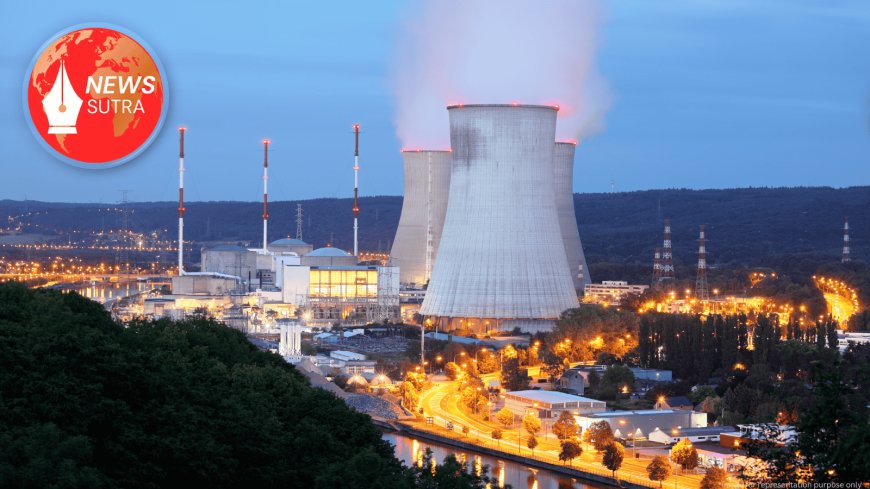Countdown to Dabaa: Egypt Ushers In Nuclear Era as First Reactor Nears Completion
Egypt nears completion of its first nuclear reactor at Dabaa, marking a historic step toward energy independence as Vibrio cases rise across the region.

DABAA, EGYPT — On Monday, August 4, Egyptian officials, along with international energy partners, marked a historic milestone as the construction of Egypt’s first nuclear reactor at the Dabaa Nuclear Power Plant entered its final phase. The project, located on the Mediterranean coast approximately 300 kilometers northwest of Cairo, is positioning Egypt as the latest entrant into the nuclear energy club — a transformative leap for the Arab world’s most populous nation.
The development comes after decades of stalled ambitions and strategic recalibrations, finally culminating in a multi-billion-dollar partnership with Russia’s state nuclear agency Rosatom. The initiative is now on schedule, with the first reactor unit expected to begin operations in 2026 — signaling the beginning of a new energy chapter in the region.
Egypt’s Nuclear Journey: From Vision to Reality
Egypt’s dream of harnessing nuclear power dates back to the late 1950s. However, a combination of geopolitical tensions, economic constraints, and regulatory delays kept the project on the back burner for over six decades. That changed in 2015, when Egypt signed a deal with Rosatom to build four VVER-1200 reactors at the Dabaa site.
The project officially broke ground in July 2022, and by August 2025, Egypt confirmed that construction of the first reactor had reached over 85% completion. President Abdel Fattah el-Sisi, who has prioritized energy independence and infrastructure modernization, called the Dabaa plant “a strategic national project that ensures a sustainable energy future for generations.”
Rosatom’s CEO Alexey Likhachev visited the site earlier this week and praised the rapid progress. “Egypt is now on the threshold of becoming a nuclear energy-producing country,” he said. “This will serve as a model for peaceful nuclear cooperation.”
Energy Independence and Economic Impact
The Dabaa Nuclear Power Plant is expected to generate 4,800 megawatts (MW) of electricity when fully operational — roughly 10% of Egypt’s total electricity demand. This move not only diversifies the country’s energy mix, which has traditionally relied on natural gas and oil, but also aligns with Egypt’s Vision 2030 strategy for economic development and environmental sustainability.
Energy analysts believe the nuclear facility will reduce Egypt’s reliance on fossil fuels, stabilize its energy grid, and help lower greenhouse gas emissions. According to a recent report by the International Atomic Energy Agency (IAEA), nuclear power could play a critical role in helping North African countries transition to low-carbon economies.
The IAEA has closely monitored the Dabaa project and praised Egypt’s commitment to safety standards, regulatory transparency, and international cooperation.
Job Creation and Technological Advancement
Beyond energy production, the Dabaa project is also delivering tangible economic benefits. It has created over 7,000 direct jobs and thousands more indirect roles in supporting sectors. Egyptian engineers, technicians, and scientists have undergone training in Russia as part of a knowledge-sharing initiative aimed at building long-term local expertise in nuclear science.
“This isn’t just about electricity. It’s about training a generation of Egyptian nuclear specialists,” said Dr. Laila Hassan, a nuclear policy researcher at the American University in Cairo. “Egypt is gaining the tools and talent to operate and manage its own nuclear infrastructure for decades to come.”
Environmental and Safety Concerns
Despite the national optimism, the Dabaa plant has not been free from scrutiny. Environmental groups and regional security analysts have raised concerns about nuclear safety, water usage, and long-term waste management.
However, Egyptian officials insist that the project complies with IAEA safety protocols and that a comprehensive environmental impact assessment has been conducted. Rosatom has also implemented passive safety systems in the VVER-1200 reactors, which are designed to automatically shut down in case of emergency.
For added security, the plant is being built in a low-seismic activity zone and will feature multiple containment layers to prevent radiation leaks.
A New Chapter in MENA’s Energy Landscape
Once operational, Dabaa will make Egypt the second African country (after South Africa) to produce nuclear power and the first in the MENA region to do so through a comprehensive turnkey deal. The implications are significant — not just for Egypt’s domestic needs but for the geopolitical dynamics of energy in the Middle East.
“This could shift the energy conversation in the region,” said Mahmoud El-Gohary, an energy analyst with the Egyptian Center for Strategic Studies. “Nuclear energy brings both prestige and responsibility. Egypt must now balance both.”
You can follow additional technical developments and project updates via Rosatom’s official website, which provides multilingual progress reports and visuals from the site.
What’s Next?
The remaining three reactors are scheduled to be completed in staggered phases through 2030, with full operational capacity expected by 2031. The focus now turns to ensuring Egypt’s Nuclear and Radiological Regulatory Authority (ENRRA) maintains strict oversight and that Egypt's population remains informed and engaged about the plant's safety and long-term strategy.
As the clock ticks toward first power in 2026, the Dabaa project stands not just as a monument of engineering — but as a symbol of Egypt’s ambition to become a scientific, energy, and technological leader in the region.











